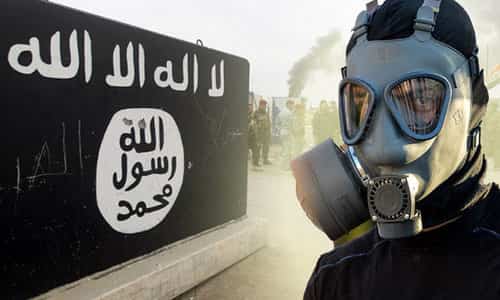ISIS Chemical Threat Closer To Reality
 By Tom Olago February 22, 2016
Share this article:
By Tom Olago February 22, 2016
Share this article:
Indications are that ISIS will attempt some form of terrorist
attack soon. It's expected to be just a matter of time - not if, but
when. How and where still remains to be seen, but the 'how' factor could
turn out to be the most disturbing aspect of all.
Just this last week an Isis cell was dismantled in
Morocco that authorities say were planning an attack involving chemical
weapons.
Ten suspects were arrested in a
raid on a safe house last Thursday. They had been planning a suicide
attack for the following day, Morocco s Central Bureau of Judicial
Investigations (BCIJ) Director Abdelhak Khiame told a press conference.
Six
jars of sulphur-containing chemical fertilizer, which when heated can
release a fatally toxic gas, were found during the raid. The chemicals
may have been put in the bombs in order to be disseminated on
detonation.
Four machine guns, thirteen tear
gas bombs and significant quantities of ammunition were also among the
weapons seized, together with an Isis flag. They were clearly well
armed to commit a major attack although it has not been revealed what
their target was.
As deadly as these
sulphur bombs would have been the real fear is that ISIS has been able
to get it's hands on radioactive material.
A
recent reuters.com article, reported that Iraq is searching for "highly
dangerous" radioactive material stolen last year. This is according to
an environment ministry document and seven security, environmental and
provincial officials who fear it could be used as a weapon if acquired
by ISIS.
According to a document seen by
Reuters and officially confirmed, the material, stored in a protective
case the size of a laptop computer, went missing in November from a
storage facility near the southern city of Basra belonging to U.S.
oilfield Services Company Weatherford WFT.N.
Weatherford
said in a statement that it was not responsible or liable for the
theft. "We do not own, operate or control sources or the bunker where
the sources are stored," it said. The material is owned by
Istanbul-based SGS Turkey, according to the document.
The
U.S. State Department said it was aware of the reports but has seen no
sign that Islamic State or other militant groups have acquired it. The
Sunni Muslim militant group has, however, been accused of using chemical
weapons on more than one occasion over the past few years.
In
November, a U.S. official said separately that Iraq had reported to the
International Atomic Energy Agency (IAEA), the Vienna-based U.N.
nuclear watchdog, a missing specialized camera containing highly
radioactive Iridium-192.
The material is
classed as a Category 2 radioactive source by the IAEA, meaning that if
not managed properly it could cause permanent injury to a person in
proximity to it for minutes or hours, and could even prove fatal to
someone actually exposed to it for a longer period. Additionally, the
ministry document said the material posed a risk of environmental harm
as well as a national security threat.
And,
with good reason, for large quantities of Ir-192 have gone missing
before in the United States, Britain, and other countries, stoking fears
among security officials that it could be used to make a dirty bomb.
A
dirty bomb combines nuclear material with conventional explosives to
contaminate an area with radiation, in contrast to a nuclear weapon,
which uses nuclear fission to trigger a vastly more powerful blast.
There
was no indication, though, that the material had come into the
possession of Islamic State, which seized territory in Iraq and Syria in
2014 but does not control areas near Basra. Iraqi forces are battling
Islamic State in the country's north and west, backed by a U.S.-led
coalition. The closest area fully controlled by Islamic State is more
than 500 km (300 miles) north of Basra in the western province of
Anbar.
That news is however not assuring, as
the U.S. believes mustard gas has been used by Islamic State in Syria
and Iraq, meaning that they already have independent sources for
acquiring chemical weapons. ISIS has no qualms about engaging in
chemical warfare as it does not subscribe to, nor make any pretense to
observe the international rules of war.
Besides
the risk of a dirty bomb, the radioactive material could cause harm
simply by being left exposed in a public place for several days, said
David Albright, a physicist and president of the Washington-based
Institute for Science and International Security.
"If
they left it in some crowded place, that would be more of the risk, if
they kept it together but without shielding," he said. "Certainly it's
not insignificant. You could cause some panic with this. They would want
to get this back."
The senior environmental official said authorities were
worried that whoever stole the material would mishandle it, leading to
radioactive pollution of "catastrophic proportions".
This
awareness has triggered a frantic search for the toxic material, with
army, police and intelligence forces working day and night to locate it,
according to a security spokesman for the Basra operations command.
Hospitals, too, have been urgently directed to contact security should
they come across patients with signs of radioactive contamination.
Fears
now abound that the dream scenario for ISIS would be to attack the U.S
with chemical weapons. According to a recent editorial report published
in investors.com, CIA Director John Brennan confirmed that the Islamic
State uses chemical weapons. This warning came just days after the
director acknowledged that ISIS is planning attacks on the U.S. homeland
in 2016.
Brennan reportedly said ISIS has
"used chemical munitions on the battlefield" and could construct
chlorine and mustard gas-releasing weapons. Defense Intelligence Agency
Director Lt. Gen. Vincent Stewart also told the Senate Armed Services
Committee that ISIS will attempt to direct attacks on the U.S. homeland
in 2016, and that the caliphate is infiltrating the refugees fleeing
the ISIS mayhem in Iraq and Syria.
It would
appear that the count-down has begun. As the investors.com editorial
asks: "If ISIS is going to cross our border and attack America, why
wouldn t it shoot for the moon and use chemical weapons against us in
assaults that would make the 9/11 attacks look like a walk in the park?"
ISIS
wouldn't even have to smuggle them in. According to medical and
biodefense experts recently interviewed by ABC News, terrorists could
easily manufacture chemical weapons surreptitiously within the U.S."
"Because
they re relatively easy and inexpensive to manufacture, chemical
weapons have long been considered the poor man's atomic bomb, " they
said, and "could be dispersed from a crop-dusting plane, from aerosols,
or by distributing the chemical in water supplies."
The
article solemnly concludes: This nation should be on Code Red right now
with a "severe risk of terrorist attack" a WMD terrorist attack that
could kill many thousands. Incredibly, President Obama abolished the
color-coded terrorism threat advisory scale five years ago.
So,
are U.S citizens doomed to remain sitting ducks just waiting for ISIS
to choose its poisons for them? Not necessarily. A recent townhall.com
article by Leah Barkoukis quotes some reassurances given by CIA
Director John Brennan.
"Believe me,
intelligence security services have stopped numerous attacks
operatives that have been moved from maybe the Iraq to Syria theater
into Europe&They have been stopped and interdicted and arrested and
detained and debriefed because of very, very good intelligence."
The
CIA chief also said the agency was aware of an attack being planned
somewhere before the November massacre in Paris, but the encryption
communication methods used by terrorists hindered efforts by law
enforcement to collect more intelligence.
This is a disturbing indication that, in some ways, ISIS is still a step ahead of law enforcement and security.

No comments:
Post a Comment